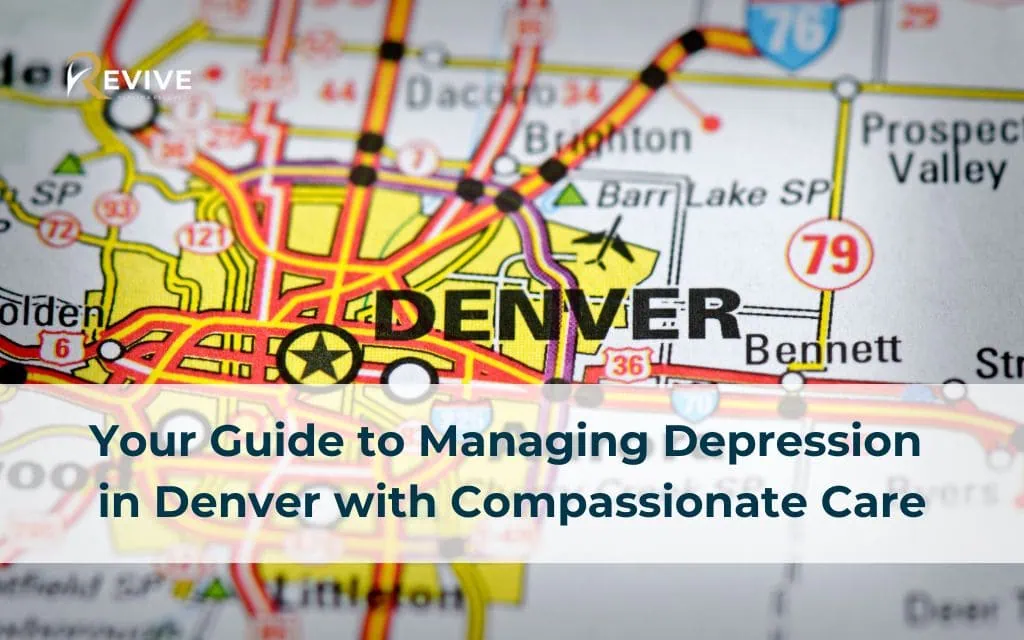Depression affects one in eight Denver residents – that’s over 76,000 people, more than the population of Denver’s four largest neighborhoods combined. As Colorado’s mental health ranking drops to 46th nationally in 2024, understanding depression’s impact in Denver has never been more critical.
While depression can affect anyone, geographical and demographic variations exist across neighborhoods, with some areas experiencing depression rates over 15%. Post-COVID factors have further complicated the mental health landscape, with reports of depression rising following infections. Despite these challenges, effective treatments exist, including therapy, medication, and innovative approaches like TMS therapy.
However, stigma remains the largest barrier to care, with nearly half of Coloradans avoiding treatment due to fear of judgment. This comprehensive guide examines depression in Denver from multiple angles, helping you navigate this complex condition and find effective, personalized treatment options.
Understanding Depression in Denver: Statistics and Trends
The Scope of Depression in Denver
Denver’s mental health landscape reveals concerning patterns. One in eight residents experiences depression, affecting approximately 76,100 people throughout the city. This prevalence exceeds many other major metropolitan areas, highlighting a critical public health challenge.
Colorado’s overall mental health status has declined significantly, with the state’s ranking falling from 30th to 46th nationally in 2024. This drop reflects increasing mental health challenges throughout the region, with depression as a leading concern. The situation worsened following the COVID-19 pandemic, when isolation, economic uncertainty, and health concerns contributed to rising depression rates.
What makes Denver’s situation unique is the contrast between resource availability and actual outcomes. Despite ranking 17th nationally for access to mental health services, residents continue to struggle with receiving adequate care, pointing to complex barriers beyond simple access issues.
Depression Rates by Denver Neighborhoods
Depression isn’t distributed evenly across Denver. Through innovative census tract mapping, researchers have identified significant variations in depression prevalence throughout the city:
- High-prevalence areas (≥15%): Several neighborhoods in southwest and northeast Denver show depression rates exceeding 15%, significantly above the city average.
- Moderate-prevalence neighborhoods (10-15%): Central Denver and parts of southeast Denver fall into this category, with rates near the city average.
- Lower-prevalence areas (<10%): Certain neighborhoods in northwest and southeast Denver report lower depression rates, though still concerning.
These geographical patterns correlate with several factors, including income levels, housing stability, and access to green spaces. Denver’s rising cost of living and housing affordability crisis contribute significantly to neighborhood-specific depression rates, particularly in areas experiencing rapid gentrification.
Demographic Patterns in Denver’s Depression Landscape
Depression affects Denver’s diverse population in varying ways:
- Gender differences: Women in Denver experience depression at higher rates (17%) compared to men (14%), consistent with national trends but with slightly elevated numbers.
- Age distribution: Denver shows a unique pattern where depression peaks in the 25-34 age group (18%), higher than national averages for this demographic. This may relate to Denver’s high concentration of young professionals facing rising living costs.
- Racial and ethnic variations: Non-Hispanic Black residents experience significantly higher depression rates (26%) compared to non-Hispanic White (14%) and Hispanic residents (15%), reflecting systemic inequities in mental health resources.
- LGBTQ+ community: Gay, lesbian, and bisexual students in Denver report depression symptoms at more than twice the rate of their heterosexual peers (58% vs. 26%), highlighting the need for specialized support services.
Perhaps most concerning is the impact on pregnant women, with depression affecting 14-23% during pregnancy – making it the most common pregnancy complication in Denver. This often-overlooked aspect of maternal health requires specialized attention.

Recognizing Depression Symptoms in Denver’s Unique Environment
Common vs. Denver-Specific Depression Indicators
While depression presents with standard clinical symptoms regardless of location—persistent sadness, loss of interest, sleep disturbances, and changes in appetite – Denver’s unique environment creates distinct patterns worth noting.
Denver’s high altitude (5,280 feet) impacts brain chemistry, potentially affecting serotonin and dopamine levels. Research shows that living at higher elevations correlates with increased depression and suicide rates. Denver’s suicide rate consistently exceeds national averages, a pattern partially attributed to this altitude effect.
The city’s climate—featuring over 300 sunny days annually—creates unique seasonal patterns. While many assume sunny weather improves mood, the intense sunlight can disrupt sleep patterns, and the contrast between highly sunny days and occasional stormy periods can trigger mood fluctuations in vulnerable individuals.
Post-COVID depression presents an emerging pattern in Denver, with studies showing approximately 18% of individuals developing depression following infection. This has created new challenges for mental health providers throughout the Denver area.
Depression’s Impact on Special Populations in Denver
Certain groups face heightened depression vulnerability in Denver:
- Pregnant women and new mothers: Approximately 24% of pregnant women in Denver screen positive for depression during pregnancy, and rates increase further postpartum. Despite this prevalence, maternal mental health services remain underdeveloped.
- First responders and healthcare workers: Denver’s first responders report staggeringly high rates of mental health issues (85%) compared to the general population. The pandemic intensified this disparity, creating a mental health crisis among those who care for others.
- College students: Denver’s substantial student population faces increasing depression rates, with campus counseling centers reporting 30-50% increases in service demand.
- Homeless population: An estimated 19% of Denver’s homeless individuals have severe mental illness, with depression often co-occurring with other conditions.
These populations require targeted interventions that address their specific circumstances and needs.
The Economic and Social Cost of Depression in Denver
Depression’s impact extends far beyond individual suffering. Denver employers report significant productivity losses, with depression accounting for an estimated $3,400 per employee annually in absenteeism, presenteeism, and disability costs.
The healthcare system bears substantial financial burden, with depression-related hospitalizations costing approximately $9,200 per admission. With limited mental health beds, this creates system-wide strain.
Denver’s housing crisis and depression form a dangerous cycle – housing instability contributes to depression, while depression makes maintaining stable housing more difficult. This relationship partially explains why neighborhoods experiencing rapid housing cost increases show corresponding rises in depression rates.
The connection to substance abuse cannot be overlooked, with Colorado ranking 48th nationally in substance use disorders. Many Denver residents report self-medicating depression symptoms with alcohol or other substances, complicating treatment and recovery.

Barriers to Depression Treatment in Denver
Understanding Denver’s Mental Health Access Paradox
Denver presents a puzzling contradiction in mental health care. The city ranks 17th nationally for access to mental health services and places in the top 10 for mental health workforce availability. Colorado experienced a 152% increase in behavioral health job openings from 2019 to 2022, indicating growth in the field.
Yet Colorado ranks 47th in per capita mental health spending, creating a disconnect where resources exist but remain inaccessible to many. This paradox explains why many Denver residents with depression go untreated despite living in a service-rich environment.
The implementation of Denver’s innovative mental health sales tax – 25 cents on $100 purchases, generating $45 million annually—aims to address these gaps, but distribution and program development challenges persist.
Stigma: Denver’s Biggest Mental Health Challenge
Despite progress in mental health awareness, stigma remains the primary barrier to depression treatment in Denver. Nearly 50% of residents report avoiding care due to concerns about judgment from others or internalized shame.
Cultural factors significantly influence treatment-seeking behaviors across Denver’s diverse communities. Some cultures emphasize self-reliance or view mental health challenges as personal weaknesses rather than treatable medical conditions.
Self-medication trends appear particularly strong in Colorado, where recreational substance availability creates accessible but problematic coping mechanisms. This often delays proper depression treatment and creates dual diagnosis situations.
Progress in destigmatization efforts continues through community education programs, employer initiatives, and public awareness campaigns, but changing deep-seated attitudes requires sustained effort.
Financial and Insurance Obstacles
Even with insurance coverage, financial concerns prevent many Denver residents from seeking depression treatment. Approximately 65% cite cost as their primary reason for avoiding care.
Insurance coverage gaps for mental health services persist despite mental health parity laws. Many plans limit session numbers, impose high deductibles for specialty care, or maintain limited provider networks that create access challenges.
Mental Health Parity Act implementation remains incomplete, with enforcement challenges allowing coverage disparities to continue. While Colorado has strengthened state-level protections, navigating these benefits remains difficult for many residents.
For uninsured Denver residents, resources exist but often involve lengthy waiting periods or limited service scopes. Community mental health centers, nonprofit providers, and sliding-scale clinics help fill gaps but cannot meet the full need.
Effective Depression Treatment Options in Denver
Traditional Treatment Approaches
Denver offers comprehensive traditional depression treatments through various providers:
- Psychotherapy options: Evidence-based approaches including Cognitive Behavioral Therapy (CBT), Interpersonal Therapy (IPT), and Dialectical Behavior Therapy (DBT) are widely available from providers like Denver Mental Health Center and Revive Health Recovery.
- Medication management: Psychiatrists throughout Denver provide medication options, from SSRIs to newer generation antidepressants, often coordinating with therapists for integrated care.
- Hospital-based programs: For severe depression, UCHealth Depression Services and other facilities offer intensive outpatient, partial hospitalization, and inpatient treatment options.
- Group therapy resources: Many Denver providers facilitate depression support and treatment groups, allowing shared experiences and mutual support in the healing process.
At Revive Health Recovery, we emphasize personalized treatment plans that may include several of these approaches, tailored to your specific needs and circumstances.
Innovative Depression Treatments Available in Denver
Denver has become a hub for cutting-edge depression treatments:
- Transcranial Magnetic Stimulation (TMS): This non-invasive procedure uses magnetic fields to stimulate nerve cells in brain regions associated with mood regulation. Several Denver providers now offer this FDA-approved treatment for treatment-resistant depression.
- Ketamine therapy: When traditional treatments fail, some Denver clinics provide ketamine treatments that can rapidly reduce depression symptoms, particularly for those with suicidal ideation.
- Integrated care models: Denver is implementing innovative approaches where mental health specialists work alongside primary care providers, creating seamless coordination. This model has shown particular effectiveness for depression treatment.
- Digital mental health tools: Telehealth options, mental health apps, and virtual support groups expanded dramatically during the pandemic and remain valuable resources for Denver residents.
Revive Health Recovery stays at the forefront of evidence-based innovations while ensuring treatments are provided with proper supervision and support.
Holistic and Complementary Depression Treatments
Denver’s natural environment and health-conscious culture support holistic approaches to depression treatment:
- Exercise and outdoor therapy: Denver’s extensive parks, mountain proximity, and outdoor recreation opportunities support exercise interventions that have proven depression benefits. Several programs formally incorporate outdoor activity into treatment protocols.
- Nutrition and lifestyle interventions: Nutrition counseling specifically targeting depression symptoms has gained traction in Denver, with programs addressing the gut-brain connection and anti-inflammatory dietary approaches.
- Mindfulness and meditation programs: Denver offers numerous resources for developing mindfulness practices that reduce depression symptoms, from community classes to specialized clinical programs.
- Community support groups: Peer-led depression support groups throughout Denver provide connection and understanding that complement formal treatment.
At Revive Health Recovery, we recognize the value of these complementary approaches and often incorporate them into comprehensive treatment plans.

FAQs About Depression in Denver and Treatment
How do depression rates in Denver compare to other Colorado cities?
Denver has slightly higher depression rates (12.5%) compared to Boulder (11.3%) and slightly lower rates than Colorado Springs (13.7%). However, Denver shows more neighborhood-specific variations than other Colorado cities. For personalized depression treatment in Denver, contact Revive Health Recovery at (303) 268-4655.
What insurance plans are accepted at Denver depression treatment centers?
Most Denver providers, including Revive Health Recovery, accept major insurance plans including Medicaid, Medicare, Cigna, United Healthcare, Blue Cross Blue Shield, Kaiser, and others. Coverage details vary by plan and provider. For specific information about insurance acceptance at Revive Health Recovery, call (303) 268-4655.
How has COVID-19 affected depression rates in Denver?
Denver has seen approximately a 25% increase in depression cases since the pandemic began. Post-COVID depression affects approximately 18% of individuals who contracted the virus. Revive Health Recovery offers specialized treatment approaches for pandemic-related depression – call (303) 268-4655 to learn more.
What are the most effective treatments for depression available in Denver?
The most effective depression treatments combine therapy (particularly CBT and IPT), medication when appropriate, lifestyle modifications, and social support. For treatment-resistant cases, TMS and ketamine therapy show promising results. Revive Health Recovery creates personalized treatment plans using evidence-based approaches—contact us at (303) 268-4655 for a consultation.
How do I find a depression therapist in Denver who specializes in my specific needs?
Consider factors like specialty areas, treatment approaches, location, and insurance acceptance. Revive Health Recovery offers comprehensive assessment services to match you with the right provider for your unique situation. Call (303) 268-4655 to discuss your specific needs and find the right depression treatment specialist.
Why Revive Health Recovery is Denver’s Premier Depression Treatment Solution
Comprehensive, Integrated Approach to Depression Treatment
At Revive Health Recovery, we believe effective depression treatment requires addressing all aspects of a person’s well-being. Our integrated approach combines:
- Personalized treatment plans: We assess each client’s unique situation, symptoms, history, and goals to create tailored depression treatment plans that evolve as recovery progresses.
- Combined therapy and medication management: Our team coordinates therapeutic interventions with medication when appropriate, ensuring seamless care and optimal outcomes.
- Evidence-based practices: We utilize treatments proven effective through rigorous research, including CBT, DBT, IPT, and other validated approaches.
- Coordination with primary care: We work collaboratively with your primary care providers to address the physical aspects of depression and ensure comprehensive health management.
This integrated approach addresses the full spectrum of depression factors, from biological influences to psychological patterns and social circumstances.
Specialized Depression Programs for Denver’s Diverse Population
Denver’s unique demographics and environment require specialized depression treatment approaches:
- Treatment for treatment-resistant depression: For clients who haven’t responded to standard treatments, we offer advanced interventions and coordinated care with specialists in TMS, ketamine therapy, and other innovative approaches.
- Programs for postpartum depression: Recognizing that depression is the most common complication of pregnancy in Denver, we provide specialized maternal mental health services that accommodate the practical needs of new mothers.
- Youth depression services: Our adolescent and young adult programs address the specific developmental challenges and environmental factors affecting Denver’s younger population.
- Cultural competency in depression care: Our diverse staff understands how cultural background influences depression expression and treatment preferences, providing culturally responsive care to Denver’s multicultural community.
These specialized programs ensure that all Denver residents can access depression treatment that respects their unique circumstances and needs.
5 Reasons to Choose Revive Health Recovery for Depression Treatment
- Experienced, specialized mental health team: Our providers bring extensive expertise in depression treatment, combining advanced training with compassionate care.
- Convenient Federal Boulevard location: Located at 1427 S Federal Blvd, our facility serves Denver residents with accessible, comfortable treatment spaces.
- Insurance acceptance and financial options: We work with major insurance providers and offer financial guidance to make quality depression treatment accessible.
- Proven track record of success: Our evidence-based approaches have helped numerous Denver residents overcome depression and rebuild fulfilling lives.
- Compassionate, stigma-free environment: We create a welcoming atmosphere where clients can discuss depression openly without judgment, fostering genuine healing.
These foundational strengths make Revive Health Recovery a trusted partner in depression recovery for Denver residents from all backgrounds.
Taking the Next Step: Depression Recovery in Denver
How to Begin Your Depression Treatment Journey
Starting depression treatment takes courage, and we’re here to make the process as smooth as possible:
- Depression screening options: Initial assessments can occur through in-person appointments or telehealth options, providing flexibility based on your comfort and circumstances.
- Initial assessment process: Your first appointment includes comprehensive evaluation of symptoms, history, and goals, creating the foundation for effective treatment.
- What to expect in your first appointment: You’ll meet with a caring professional who will listen to your experiences, ask clarifying questions, and begin developing treatment recommendations.
- Creating your personalized treatment plan: Based on your assessment, we’ll collaborate with you to create a depression treatment plan addressing your specific needs and preferences.
Taking this first step is often the hardest part of depression recovery. Contact us at (303) 268-4655 to begin your healing journey today.
Supporting a Loved One with Depression in Denver
When someone you care about struggles with depression, your support makes a difference:
- Recognizing warning signs: Learn to identify depression symptoms that may manifest as irritability, withdrawal, sleep changes, or decreased functioning in work or relationships.
- How to have the conversation: Approach your loved one with compassion, expressing concern without judgment and offering to help them connect with professional support.
- Local family support resources: Denver offers numerous family education programs and support groups through organizations like National Alliance on Mental Illness (NAMI) Denver.
- Crisis intervention options: Familiarize yourself with Denver’s crisis services, including the Colorado Crisis Services hotline (1-844-493-8255) and walk-in centers.
Revive Health Recovery provides family education and support services to help you effectively assist your loved one while maintaining your own well-being.
Building a Depression Recovery Community in Denver
Sustainable recovery from depression often requires community support:
- Support groups and peer networks: Denver offers numerous depression support groups, both general and specific to particular populations or circumstances.
- Employer resources and workplace support: Many Denver employers now provide Employee Assistance Programs and mental health benefits that can connect employees with depression treatment.
- Community mental health initiatives: Denver’s mental health tax funds innovative community-based programs addressing depression through various approaches.
- Advocacy opportunities: Organizations like Mental Health Colorado offer ways to participate in improving mental health policies and resources across the state.
Revive Health Recovery connects clients with appropriate community resources to complement clinical treatment and support long-term well-being.
Finding Hope: Your Depression Recovery Journey Starts Here
Depression affects thousands of Denver residents, but effective treatment is available. At Our Denver Emotional Balance Support, our integrated approach combines evidence-based therapies, medication management when appropriate, and personalized support to help you reclaim your life from depression. Our convenient location at 1427 S Federal Blvd makes quality mental health care accessible to residents throughout Denver. Don’t let depression control your life any longer – contact Revive Health Recovery at (303) 268-4655 for a confidential consultation and take the first step toward healing today.



